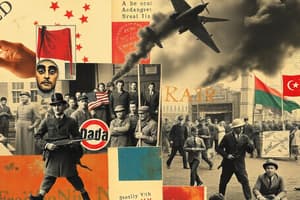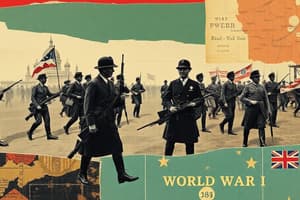Podcast
Questions and Answers
Which of the following are considered causes of WWI? (Select all that apply)
Which of the following are considered causes of WWI? (Select all that apply)
- Militarism (correct)
- Alliance System (correct)
- Imperialism (correct)
- Nationalism (correct)
Who was Archduke Franz Ferdinand?
Who was Archduke Franz Ferdinand?
Archduke of Austria-Hungary assassinated by a Serbian in 1914
What were the Central Powers in WWI?
What were the Central Powers in WWI?
Germany, Austria-Hungary, Bulgaria, and the Ottoman Empire
Which countries formed the Allied Powers?
Which countries formed the Allied Powers?
What is the Western Front?
What is the Western Front?
What was the Eastern Front in WWI?
What was the Eastern Front in WWI?
What is trench warfare?
What is trench warfare?
What is No Man's Land?
What is No Man's Land?
Which of the following were new technologies in WWI? (Select all that apply)
Which of the following were new technologies in WWI? (Select all that apply)
What was the Lusitania?
What was the Lusitania?
What was the Zimmermann telegram?
What was the Zimmermann telegram?
What were Doughboys?
What were Doughboys?
What was the impact of the Russian Revolution on WWI?
What was the impact of the Russian Revolution on WWI?
What is an armistice?
What is an armistice?
The war started in _____ and ended in _____
The war started in _____ and ended in _____
What were the Fourteen Points?
What were the Fourteen Points?
What was the League of Nations?
What was the League of Nations?
What was the Treaty of Versailles?
What was the Treaty of Versailles?
What are reparations?
What are reparations?
Who was President Wilson?
Who was President Wilson?
Flashcards are hidden until you start studying
Study Notes
Causes of WWI
- Militarism, Alliance System, Imperialism, and Nationalism were key factors leading to the outbreak of World War I.
Archduke Franz Ferdinand
- Assassinated in 1914 by a Serbian; his death triggered the beginnings of WWI.
Central Powers
- Comprised Germany, Austria-Hungary, Bulgaria, and the Ottoman Empire.
Allied Powers
- Initially included Britain, France, and Russia; later joined by Italy and the United States.
Western Front
- The frontline in WWI located at the borders of France, Germany, and Belgium, marked by intense fighting between the Allies and Central Powers.
Eastern Front
- The battleground in Russia where Allied and Central Powers clashed during the war.
Trench Warfare
- Combat strategy involving the construction of long, deep trenches, resulting in grueling stalemates along the front lines.
No Man's Land
- The perilous territory between opposing trenches, characterized by danger and destruction.
New Weapons/WWI Technology
- Innovations included machine guns, tanks, airplanes, poison gas, submarines, and grenades, drastically changing combat dynamics.
Lusitania
- A British ship sunk by German U-boats, causing the loss of 139 American lives and prompting U.S. considerations for entering the war.
Zimmermann Telegram
- A message from Germany to Mexico in 1917, proposing military alliance in exchange for the recovery of lost territories if they declared war on the U.S.
Dough Boys
- Nickname for American soldiers during WWI, signifying their role and contributions to the conflict.
Russian Revolution and Impact on WWI
- The overthrow of the Russian Czar led to a temporary government continuing the fight; however, Russia eventually exited the war, allowing Germany to reallocate troops to the Western Front.
Armistice
- An agreement between warring parties to cease hostilities, paving the way for peace negotiations.
Dates the War Started and Ended
- World War I lasted from 1914 to 1918.
Fourteen Points
- President Wilson's proposal aimed at achieving lasting peace, promoting self-determination, and forming the League of Nations.
League of Nations
- An international organization established post-WWI to mediate conflicts between countries, ultimately proving ineffective in preventing future wars.
Treaty of Versailles
- The peace settlement signed by Germany and the victorious Allies, leading to severe restrictions on Germany’s military capabilities and reparations amounting to $33 billion.
Reparations
- Financial compensations required from the defeated nations for war damages inflicted during the conflict.
President Wilson
- The 28th President of the United States who played a pivotal role in leading America through WWI and advocating for the establishment of the League of Nations.
Studying That Suits You
Use AI to generate personalized quizzes and flashcards to suit your learning preferences.




